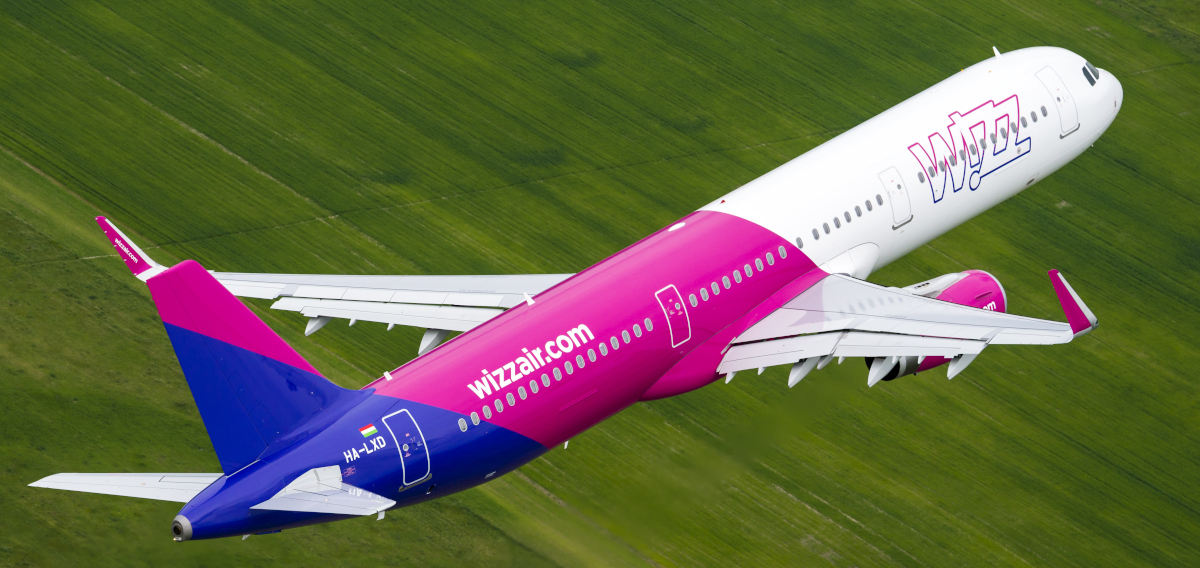Wizz Air Named Most Sustainable Low-Cost Airline for Third Consecutive Year

Airline Receives the Latest Honour at the World Finance Sustainability Awards
Wizz Air, Europe’s fastest-growing and most environmentally sustainable airline globally[1], has been named the Most Sustainable Low-Cost Airline for the third consecutive year at the World Finance Sustainability Awards 2023.
World Finance praised Wizz Air’s sustainability credentials and commitment to reducing emissions intensity by a further 25% by the end of the decade[2]. The judging panel recognized the airline’s continued investment in the latest technology, the renewal of its aircraft fleet, fuel efficiency initiatives, sustainable aviation fuel (SAF) partnerships, including investments in research and development, and exploration into hydrogen-powered aircraft with Airbus.
Now in its fifth year, the World Finance Sustainability Awards celebrate businesses putting sustainability at the forefront of operations. The award categories cover thirty industry segments, from healthcare and digital currency to aviation.
Wizz Air achieved its lowest-ever carbon intensity for one fiscal year[3], amounting to 53.8 grams per passenger/km in fiscal year 2023. This represents a 6% reduction from pre-COVID levels[4]. To achieve this, the airline has invested heavily in its fleet by replacing older aircraft with new Airbus A321neo aircraft, which offer significant environmental benefits in terms of noise reduction and fuel saving and can currently fly with up to 50% SAF blend[5]. The share of the new “neo” technology Airbus A320 family aircraft has now surpassed 50% of Wizz Air’s fleet.
Wizz Air has also established a strategy for sustainable aviation fuel (SAF), which includes securing offtake agreements with suppliers for the future and has already partnered with Mabanaft, Neste, OMV and Cepsa. In April 2023, Wizz Air announced its first equity investment in a biofuel company, Firefly Green Fuels, to further support SAF development in the UK. In May 2023, the airline, as part of Indigo Partners, invested in the US-based SAF start-up Clean Joule.
Yvonne Moynihan, Corporate & ESG Officer, said: “We are truly honoured to receive recognition for our unwavering commitment to sustainable practices within the aviation industry from World Finance for the third year in a row. At Wizz Air, we are whole-heartedly dedicated to prioritising the reduction of carbon emissions intensity and adopting pioneering practices. We have embraced strategic initiatives including investing in the latest aircraft and innovative alternative fuel technologies and exploring the potential for hydrogen-powered zero emission aircraft. This award is a testament to the hard work and dedication of our Wizz team, are committed to the Group’s environmental stewardship by ensuring we remain industry leaders in sustainability and leading the way in the low-cost aviation sector.”
Monika Wojcik, Head of Special Projects, said: “Finance Magazine recognizes companies that are actively committed to making significant changes in the areas of environment, society, and corporate governance. A sustainable commitment is becoming increasingly important given the state of the planet. We were particularly impressed by Wizz Air’s achievement to become a market-leading airline with outstanding credentials regarding sustainability position by continued investment in the latest technology and the airline’s continuous improvement to reduce the carbon footprint per passenger traveling on the airline planes, operating one of the youngest aircraft fleets in the world with consistently the lowest CO2 intensity performance in Europe, investment in Firefly Green Fuels’ research and development, adding to the overall ESG credentials.”
[1] According to the CAPA – Centre for Aviation Awards for Excellence 2022
[2] Compared to FY20 baseline
[3] Based on Wizz Air’s official annual reporting
[4] Based on comparison FY23 to FY19
[5] SAF must be blended with conventional jet fuel to meet regulatory requirements for use within the aircraft. Wizz Air used 0.005% of SAF in FY23
